The search for jobs and a recovery in Red Deer: 'There's absolutely nothing out there'
Sean might consider himself lucky since he's been out of work only since December. The 46-year-old is pretty succinct when asked to describe the economic climate in this city of 100,000.
"It sucks," he says, after picking up a few crates of food from the Red Deer Food Bank. He didn't want to give CBC News his last name.
By his count, he's applied for 40 to 50 jobs since he was laid off seven weeks ago.
"There's nothing out there. There's absolutely nothing out there for my kind of line of work."
In Red Deer, more storefronts, industrial bays and offices are being emptied out as the province's economic slump enters its sixth year. Economic diversification and resuscitating the downtown are some of the priorities in this blue collar town known for its ties to oil and gas and agriculture.

At McLevin Industries, the family-run business has been around for almost as long as Red Deer itself. The metal and steel manufacturing shop opened in 1917, when Conservative Robert Borden was prime minister.
"I like to joke, I know I don't look a day over 90," said Linda McLevin, who co-owns the business with her husband, Alan, whose grandfather opened the shop and was one of Red Deer's first blacksmiths.
"Don't see light at the end of the tunnel'
McLevin and her husband are the third generation to run the shop. They've seen plenty of ups and downs, including the recession in the early 1980s — and their sons' decision in 2014 to step away from the business, possibly threatening the family legacy.
She says she is generally a positive person, but she just can't see an end to this current slump.
"Our own personal feeling is we don't see light at the end of the tunnel."
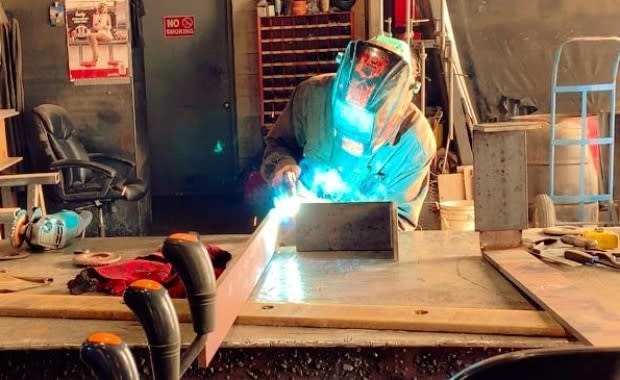
Since 2014, she says, revenues at the company have plunged 40 per cent and they've shed 19 jobs — including Linda's two sons, who dabbled for a bit at the shop but decided to move on.
"They kind of saw the writing on the wall and pursued other interests," she said.
Today, the company has just six employees. Before the recession, the McLevins planned to move to a new facility they were going to build on 44 acres of land they purchased and converted into an industrial park. Those plans have long been scrapped and most of the parcel sold.
Office, retail, industrial vacancies rise
Such is the state of Red Deer's real estate market. There are vast spaces of industrial parks that have been hollowed out, in many cases prices and lease rates have been cut.
Even though 2019 saw more industrial space occupied than vacated for the first time since 2014, the overall feeling is gloomy.
"There's not a lot of factors that play into the optimism that things are going to get better. When you look at the market sentiment out there, what people's perception of the economy is, it's overall negative," said Brett Salomons of Salomons Commercial realty.

The company's name is all over town, advertising office, retail and industrial space that is desperate for a new owner or tenant.
The downtown office vacancy rate is hovering around 15 per cent, while the industrial vacancy rate dipped below 10 per cent for the first time in years. However, Edgar Industrial Park, the city's largest with 3.2-million square feet of space, also has a vacancy rate of 15 per cent.
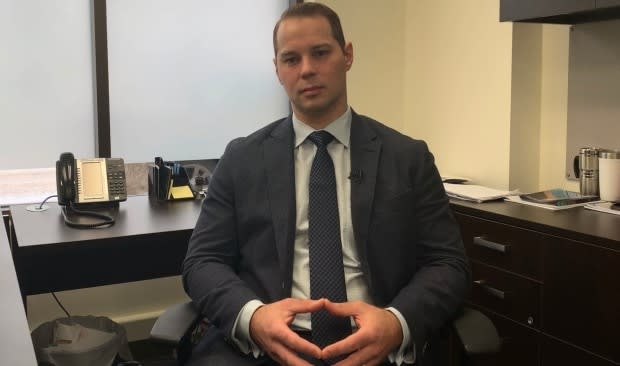
Salomons says several oil and gas service companies have either closed or moved away to other parts of Alberta, B.C. or the United States.
"The overall confidence is at an all-time low," he said.
He cites the lack of pipeline capacity, climate change and what he calls Ottawa's anti-Alberta policies for putting the squeeze on the province's main industry.
After peaking at $334,000 in August 2017, the median house price in Red Deer last month settled in at $290,000 — a 13 per cent drop.
Economic diversification
The mayor of Red Deer says if the city is serious about an economic revival, it needs to diversify its economy and soon. Tara Veer says her community has been making some strides, but it's going to be a marathon, not a sprint.
She says Red Deer College's multi-year transition to a university is a significant step forward, along with the community's recent success at attracting major events, including the Canadian Finals Rodeo, the Canada Winter Games and this year's world junior hockey championship, with games in both Red Deer and Edmonton.
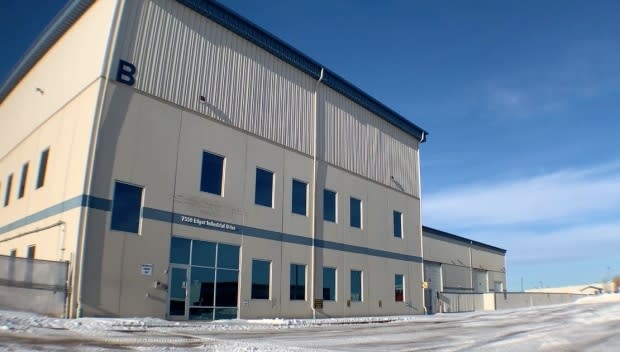
"But we do continue to struggle," said Veer.
"We've had significant closures, particularly in our industrial parks, and obviously that has a reverberating effect throughout our local economy and it's deeply concerning," she said.
The fallout includes growing concerns about social disorder in the downtown related to homelessness and issues connected to a supervised drug consumption site.
"It's exacerbated the challenges that we face as a community," said Veer.
Strained social agencies
The Red Deer Food Bank says it's now helping as many as 50 people and families every day. Not only are people hungry, but some are stressed out and some have lashed out at staff and volunteers.
It's prompted a warning, taped to the front door, against abusive and belligerent behaviour.
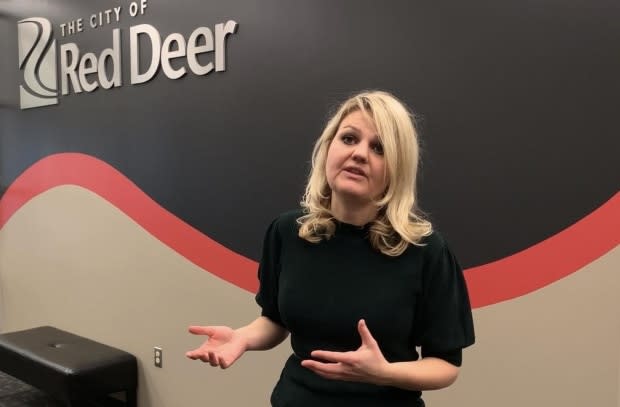
"Not being able to feed your family has got to be the highest level of stress for anybody," said Alice Kolisnyk, deputy director of the food bank.
"So yeah, they're very distressed, and to come into a food bank to ask for help, it escalates. We do our very best to reassure them we're here to help them," she said.
Demand up, funding uncertain
Another agency is putting families on wait lists for some programs, including counselling, which has seen increased demand from families trying to cope with myriad issues tied to the economic downturn.
"I think we all know when money's tight … you get stressed. So when when parents are stressed, they don't manage children's behaviours as well," said Judy Scott, the executive director of Family Services of Central Alberta.
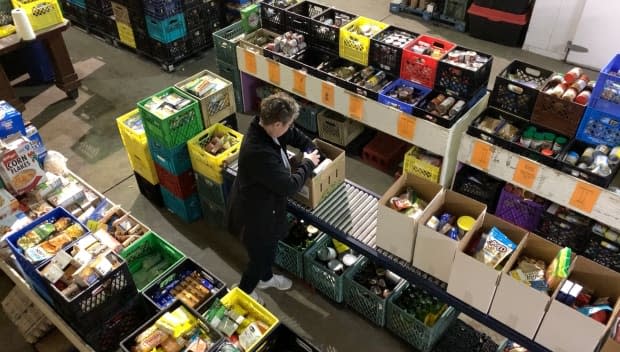
While pressure builds to help more people, the agency is being asked to reapply for provincial funding for two of its main programs, home visitation and parenting skills. Scott has already been warned to expect less funding. As a result, she's had to notify as many as 20 of her employees that their jobs could be eliminated by the end of March.
"The reality is there will be change in services, there will be some of our services that we will no longer have," she said.
While she supports some of the proposed funding changes that are, in part, aimed at eliminating the duplication of some services, she says now is not the time to cut when more families are seeking help.
"Somebody's losing out and unfortunately that's going to be families."
Downtown turnaround
City council recently approved a fund to help kick start residential development in the downtown to lure more people to not only live in the core, but to at least spend an afternoon or evening at different events such as live music or other family friendly events.
"We are we're very cognizant of what's going on in our downtown, which is why we're trying to incentivize it, and it doesn't seem like there's going to be a quick turnaround," said John Sennema, with the city's land and economic development department.

He says one of Red Deer's best features is its location, almost smack dab in the middle between Calgary and Edmonton. It also has less expensive industrial land and the untapped potential of the Red Deer Regional Airport, which is trying to lure logistics companies among others.
Bucking the trend
It's not all doom and gloom. DataCan is a Red Deer based company that manufactures monitoring equipment for the oil and gas industry. The company has hired two dozen people since 2018 and now employs 39 people. It recently opened an office in Houston, Texas. A big part of its success is that its customers are all over the world — a strategy that's protected it from the slump in Alberta.
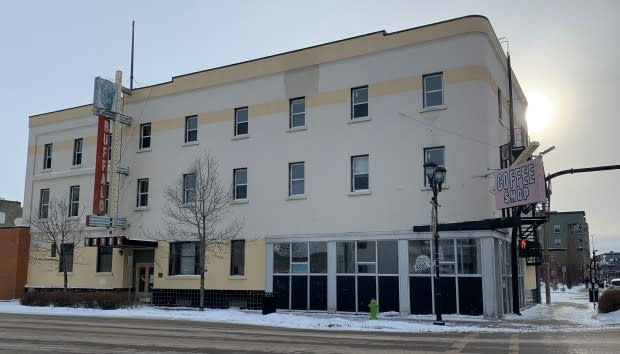
"Alberta's not really where the market is right now," said James Wright, one of the company's co-founders who started manufacturing the equipment in his basement years ago.
"So, we have started a shop in the United States in Texas and it's booming down in Texas. It's booming in various other parts the United States and pretty much the entire world right now. Oil's worth enough right now that people are spending money; in Canada they are not," said Wright.
Wright says for Red Deer to emerge from this long slump, more people need to believe in the province's oil and gas industry.
"Because if they don't, it could get worse here. It's easy to take this money that could be spent in Alberta and take it to Texas, North Dakota, Colorado," he said.
Back at McLevins, while they've sold most of the land that was going to be used for their new shop, there's one piece left that they just can't unload.
"We've had our 9.26 acres for sale for three or four years and not even an offer, not even a low-ball offer," she said.
As for the future of their business, McLevin says they have no plans to close or layoff more people. It's a decision that's led to some tough choices. She says she and her husband have been working for free for a few years.
"We haven't taken a regular paycheque for some years," said McLevin.
"Since 2014, we have basically gone to Plan B, which is we will stick here and ride it out and see what happens."
Bryan Labby is an enterprise reporter with CBC Calgary. If you have a good story idea or tip, you can reach him at bryan.labby@cbc.ca or on Twitter at @CBCBryan.


